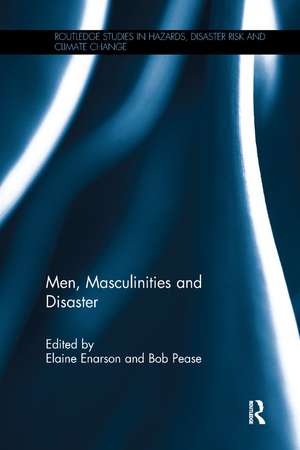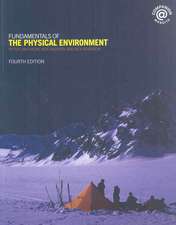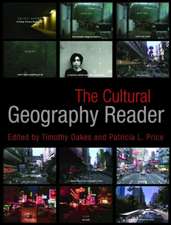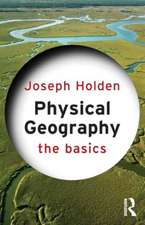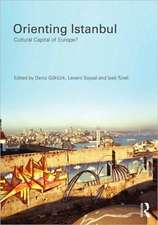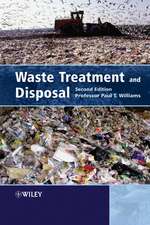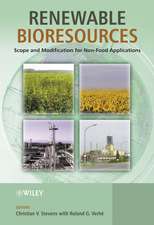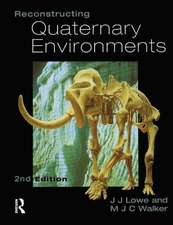Men, Masculinities and Disaster: Routledge Studies in Hazards, Disaster Risk and Climate Change
Editat de Elaine Enarson, Bob Peaseen Limba Engleză Paperback – 25 iul 2018
With a foreword from Kenneth Hewitt, an afterword from Raewyn Connell and contributions from renowned international experts, this book helps address the gap. It explores disasters in diverse environmental, hazard, political and cultural contexts through original research and theoretical reflection, building on the under-utilized orientation of critical men’s studies. This body of thought, not previously applied in disaster contexts, explores how men gain, maintain and use power to assert control over women. Contributing authors examine the gender terrain of disasters 'through men's eyes,' considering how diverse forms of masculinities shape men’s efforts to respond to and recover from disasters and other climate challenges. The book highlights both the high costs paid by many men in disasters and the consequences of dominant masculinity practices for women and marginalized men. It concludes by examining how disaster risk can be reduced through men's diverse efforts to challenge hierarchies around gender, sexuality, disability, age and culture.
| Toate formatele și edițiile | Preț | Express |
|---|---|---|
| Paperback (1) | 413.33 lei 43-57 zile | |
| Taylor & Francis – 25 iul 2018 | 413.33 lei 43-57 zile | |
| Hardback (1) | 1002.60 lei 43-57 zile | |
| Taylor & Francis – 14 iun 2016 | 1002.60 lei 43-57 zile |
Din seria Routledge Studies in Hazards, Disaster Risk and Climate Change
-
 Preț: 292.89 lei
Preț: 292.89 lei - 8%
 Preț: 390.50 lei
Preț: 390.50 lei - 9%
 Preț: 934.94 lei
Preț: 934.94 lei - 9%
 Preț: 936.94 lei
Preț: 936.94 lei -
 Preț: 286.20 lei
Preț: 286.20 lei -
 Preț: 311.41 lei
Preț: 311.41 lei -
 Preț: 278.13 lei
Preț: 278.13 lei -
 Preț: 465.39 lei
Preț: 465.39 lei -
 Preț: 389.66 lei
Preț: 389.66 lei - 18%
 Preț: 138.22 lei
Preț: 138.22 lei -
 Preț: 384.86 lei
Preț: 384.86 lei -
 Preț: 389.66 lei
Preț: 389.66 lei -
 Preț: 385.62 lei
Preț: 385.62 lei - 18%
 Preț: 1000.89 lei
Preț: 1000.89 lei - 18%
 Preț: 896.71 lei
Preț: 896.71 lei -
 Preț: 416.22 lei
Preț: 416.22 lei -
 Preț: 389.38 lei
Preț: 389.38 lei - 18%
 Preț: 1000.27 lei
Preț: 1000.27 lei - 17%
 Preț: 272.50 lei
Preț: 272.50 lei -
 Preț: 389.66 lei
Preț: 389.66 lei - 18%
 Preț: 1002.60 lei
Preț: 1002.60 lei -
 Preț: 385.02 lei
Preț: 385.02 lei -
 Preț: 390.41 lei
Preț: 390.41 lei -
 Preț: 420.76 lei
Preț: 420.76 lei - 17%
 Preț: 269.00 lei
Preț: 269.00 lei -
 Preț: 453.53 lei
Preț: 453.53 lei -
 Preț: 383.17 lei
Preț: 383.17 lei - 18%
 Preț: 1001.84 lei
Preț: 1001.84 lei - 15%
 Preț: 475.62 lei
Preț: 475.62 lei - 18%
 Preț: 893.27 lei
Preț: 893.27 lei - 17%
 Preț: 272.64 lei
Preț: 272.64 lei
Preț: 413.33 lei
Nou
Puncte Express: 620
Preț estimativ în valută:
79.10€ • 82.08$ • 66.11£
79.10€ • 82.08$ • 66.11£
Carte tipărită la comandă
Livrare economică 17-31 martie
Preluare comenzi: 021 569.72.76
Specificații
ISBN-13: 9781138324602
ISBN-10: 1138324604
Pagini: 268
Dimensiuni: 156 x 234 x 25 mm
Greutate: 0.39 kg
Ediția:1
Editura: Taylor & Francis
Colecția Routledge
Seria Routledge Studies in Hazards, Disaster Risk and Climate Change
Locul publicării:Oxford, United Kingdom
ISBN-10: 1138324604
Pagini: 268
Dimensiuni: 156 x 234 x 25 mm
Greutate: 0.39 kg
Ediția:1
Editura: Taylor & Francis
Colecția Routledge
Seria Routledge Studies in Hazards, Disaster Risk and Climate Change
Locul publicării:Oxford, United Kingdom
Public țintă
Postgraduate and UndergraduateCuprins
Foreword
Section 1: Critical men’s studies and disaster1. The Gendered Terrain of Disaster: Thinking About Men and Masculinities
2. Masculinism, Climate Change and ‘Man-Made’ Disasters: Towards an Environmental Profeminist Response
3. Men and Masculinities in the Social Movement for a Just Reconstruction After Hurricane Katrina
4. Hyper-Masculinity and Disaster: The Reconstruction of Hegemonic Masculinity in the Wake of Calamity
5. Re-Reading Gender and Patriarchy Through a ‘Lens of Masculinity:’ The ‘Known’ Story and New Narratives From Post-Mitch Nicaragua
Section 2: The high cost of disaster for men: Coping with loss and change
6. Men, Masculinities and Wildfire: Embodied Resistance and Rupture
7. Emotional and Personal Costs for Men of the Black Saturday Bushfires in Victoria, Australia
8. The Tsunami's Wake: Mourning and Masculinity in Eastern Sri Lanka
9. Japanese Families Decoupling Following the Fukushima Nuclear Plant Disaster: Men’s Choice between Economic Stability and Radiation Exposure
Section 3: Diversity of impact and response among men in the aftermath of disaster
10. Disabled Masculinities and Disasters
11. Masculinity, Sexuality and Disaster: Unpacking Gendered LGBT Experiences in the 2011 Brisbane Floods, Queensland, Australia
12. Indigenous Masculinities in a Changing Climate: Vulnerability and Resilience In the United States
13. Youth Creating Disaster Recovery and Resilience in Canada and the United States: Dimensions of the Male Youth Experience
Section 4: Transforming masculinity in disaster management
14. Firefighters, Technology and Masculinity in the Micro-management of Disasters: Swedish Examples
15. Resisting and Accommodating the Masculinist Gender Regime in Firefighting: An Insider View from the United Kingdom
16. Using a Gendered Lens to Reduce Disaster and Climate Risk in Southern Africa: The Potential Leadership of Men’s Organizations
17. Training Pacific Male Managers for Gender Equality in Disaster Response and Management
18. Integrating Men and Masculinities in Caribbean Disaster Risk Management
19. Men, Masculinities and Disaster: An Action Research Agenda
20. Afterword
Section 1: Critical men’s studies and disaster1. The Gendered Terrain of Disaster: Thinking About Men and Masculinities
2. Masculinism, Climate Change and ‘Man-Made’ Disasters: Towards an Environmental Profeminist Response
3. Men and Masculinities in the Social Movement for a Just Reconstruction After Hurricane Katrina
4. Hyper-Masculinity and Disaster: The Reconstruction of Hegemonic Masculinity in the Wake of Calamity
5. Re-Reading Gender and Patriarchy Through a ‘Lens of Masculinity:’ The ‘Known’ Story and New Narratives From Post-Mitch Nicaragua
Section 2: The high cost of disaster for men: Coping with loss and change
6. Men, Masculinities and Wildfire: Embodied Resistance and Rupture
7. Emotional and Personal Costs for Men of the Black Saturday Bushfires in Victoria, Australia
8. The Tsunami's Wake: Mourning and Masculinity in Eastern Sri Lanka
9. Japanese Families Decoupling Following the Fukushima Nuclear Plant Disaster: Men’s Choice between Economic Stability and Radiation Exposure
Section 3: Diversity of impact and response among men in the aftermath of disaster
10. Disabled Masculinities and Disasters
11. Masculinity, Sexuality and Disaster: Unpacking Gendered LGBT Experiences in the 2011 Brisbane Floods, Queensland, Australia
12. Indigenous Masculinities in a Changing Climate: Vulnerability and Resilience In the United States
13. Youth Creating Disaster Recovery and Resilience in Canada and the United States: Dimensions of the Male Youth Experience
Section 4: Transforming masculinity in disaster management
14. Firefighters, Technology and Masculinity in the Micro-management of Disasters: Swedish Examples
15. Resisting and Accommodating the Masculinist Gender Regime in Firefighting: An Insider View from the United Kingdom
16. Using a Gendered Lens to Reduce Disaster and Climate Risk in Southern Africa: The Potential Leadership of Men’s Organizations
17. Training Pacific Male Managers for Gender Equality in Disaster Response and Management
18. Integrating Men and Masculinities in Caribbean Disaster Risk Management
19. Men, Masculinities and Disaster: An Action Research Agenda
20. Afterword
Notă biografică
Elaine Enarson is an independent scholar based in Colorado, USA.
Bob Pease is Professor of Social Work at the University of Tasmania, Australia.
Bob Pease is Professor of Social Work at the University of Tasmania, Australia.
Recenzii
‘In this pathbreaking new book, Enarson and Pease have stretched the gender boundaries of disaster studies. The book reminds us there are multiple pieces of the gender and disasters puzzle, including men, masculinities, and sexualities. They show that men are both impacted and empowered by disasters in ways that build on their often privileged, but sometimes uniquely vulnerable positions in society. The essays in this fascinating collection document how some disasters reinforce men’s dominance, while others threaten their livelihoods and undermine their authority. This timely and pivotal collection opens our eyes to the gendered complexity that results when men as well as women are the subjects of disaster studies.’ - Joane Nagel, political and cultural sociologist and Distinguished Professor at the University of Kansas
'Men, Masculinities and Disaster is a major book whose many messages are ignored, literally at our peril. It brings the weight of feminist and profeminist analysis of men and masculinities to the questions of what happens before, during and after disasters; why disasters occur; and how they can be reduced and prevented. The many expert contributions combine strong empirical analysis, gender theoretical insights, and at times personal reflection. Elaine Enarson and Bob Pease have produced a truly major contribution that makes crystal clear the urgency of bringing together feminism and environmentalism in disaster studies.' - Jeff Hearn, author of Men of the World; Örebro University, Sweden; Hanken School of Economics, Finland; University of Huddersfield, UK
'This book confronts a paradox: disasters generally privilege males but we have very little solid evidence on the male experience of disaster and disaster risk reduction. Gender (and disaster) studies have long focused on the largest marginalized group – women – which sends the message that ‘women are the problem’. This research emphasis operates in the same way as that in race studies, which have long focused on people of color instead of the white power wielders. This book is welcome for that shift in emphasis and doubly welcome for its attention to intersectionality and complex social relations. Elaine Enarson and Bob Pease are to be congratulated on curating a collection which crosses so many boundaries: gender, sexuality, age, race/ethnicity, the global north-south divide, discipline and practice. I am sure this will be a book well used by students and scholars. Hopefully, practitioners and policy makers will also engage with the ideas here and see the benefit of squeezing time from busy schedules to read something which offers them a different route through both disasters and the everyday.' - Maureen Fordham, Professor of Gender and Disaster Resilience, Northumbria University, UK and Coordinator of the Gender and Disaster Network
'The detailed research and practical knowledge shared in this book about men and masculinities in the context of disasters offers new and valuable insights into how men, and the organisations and systems they influence and lead, respond to the disruptions and challenges of emergencies. The book also addresses the implications this has for the health and well-being of men, women and children, and will help guide efforts to strengthen community resilience to emergencies.' - Craig Lapsley, Emergency Management Commissioner, Emergency Management Victoria
"I suggest the book to be read by disaster relief workers and planners as well as anyone involved in environmental policy-making in order to understand what harm the ignorance of gender and norms of masculinity does to human beings, of all genders. For those active in the field of climate change, I believe this book can inspire to widen the gaze from so called “vulnerable women” to also look further into the role of masculinities, men and intersecting social constructs that decide our position in a changing environment." - Angelica Wågström, GenderCC (2016)
'The contributions in the book provide readers with a rich intersectional analysis of gender and disasters, applying a variety of social perspectives, and employing a wide range of methodologies. Men, Masculinities and Disasters clearly illustrates the need for an understanding of men and masculinities in all climate and disaster planning, and through its exposition, helps make this a more achievable aim.' - Cheney Shreve Independent Consultant and Senior Partner with Gender, Etc., Gender & Development, 2017 VOL. 25, NO. 1, 143–152
'As is evident, this book offers a discourse that is diverse (in both geography and subject) around men, masculinity and disasters. It serves to bring the two disciplines of gender and disasters closer and highlight their interlinkages. Men, Masculinities and Disaster can be read as a whole or individual chapters read for specific interest, and it is relevant to development practitioners, academics and students, among others.'
Hannah Keren Lee, Environment & Urbanization
'Men, Masculinities and Disaster is a major book whose many messages are ignored, literally at our peril. It brings the weight of feminist and profeminist analysis of men and masculinities to the questions of what happens before, during and after disasters; why disasters occur; and how they can be reduced and prevented. The many expert contributions combine strong empirical analysis, gender theoretical insights, and at times personal reflection. Elaine Enarson and Bob Pease have produced a truly major contribution that makes crystal clear the urgency of bringing together feminism and environmentalism in disaster studies.' - Jeff Hearn, author of Men of the World; Örebro University, Sweden; Hanken School of Economics, Finland; University of Huddersfield, UK
'This book confronts a paradox: disasters generally privilege males but we have very little solid evidence on the male experience of disaster and disaster risk reduction. Gender (and disaster) studies have long focused on the largest marginalized group – women – which sends the message that ‘women are the problem’. This research emphasis operates in the same way as that in race studies, which have long focused on people of color instead of the white power wielders. This book is welcome for that shift in emphasis and doubly welcome for its attention to intersectionality and complex social relations. Elaine Enarson and Bob Pease are to be congratulated on curating a collection which crosses so many boundaries: gender, sexuality, age, race/ethnicity, the global north-south divide, discipline and practice. I am sure this will be a book well used by students and scholars. Hopefully, practitioners and policy makers will also engage with the ideas here and see the benefit of squeezing time from busy schedules to read something which offers them a different route through both disasters and the everyday.' - Maureen Fordham, Professor of Gender and Disaster Resilience, Northumbria University, UK and Coordinator of the Gender and Disaster Network
'The detailed research and practical knowledge shared in this book about men and masculinities in the context of disasters offers new and valuable insights into how men, and the organisations and systems they influence and lead, respond to the disruptions and challenges of emergencies. The book also addresses the implications this has for the health and well-being of men, women and children, and will help guide efforts to strengthen community resilience to emergencies.' - Craig Lapsley, Emergency Management Commissioner, Emergency Management Victoria
"I suggest the book to be read by disaster relief workers and planners as well as anyone involved in environmental policy-making in order to understand what harm the ignorance of gender and norms of masculinity does to human beings, of all genders. For those active in the field of climate change, I believe this book can inspire to widen the gaze from so called “vulnerable women” to also look further into the role of masculinities, men and intersecting social constructs that decide our position in a changing environment." - Angelica Wågström, GenderCC (2016)
'The contributions in the book provide readers with a rich intersectional analysis of gender and disasters, applying a variety of social perspectives, and employing a wide range of methodologies. Men, Masculinities and Disasters clearly illustrates the need for an understanding of men and masculinities in all climate and disaster planning, and through its exposition, helps make this a more achievable aim.' - Cheney Shreve Independent Consultant and Senior Partner with Gender, Etc., Gender & Development, 2017 VOL. 25, NO. 1, 143–152
'As is evident, this book offers a discourse that is diverse (in both geography and subject) around men, masculinity and disasters. It serves to bring the two disciplines of gender and disasters closer and highlight their interlinkages. Men, Masculinities and Disaster can be read as a whole or individual chapters read for specific interest, and it is relevant to development practitioners, academics and students, among others.'
Hannah Keren Lee, Environment & Urbanization
Descriere
This book elaborates on diverse dominant practices of masculinity in disasters and how this shapes recovery and resilience. Original studies in diverse environmental, hazard, and cultural contexts highlight the high costs paid by men emotionally, and how diverse forms of masculinities shape their efforts to respond and recover from disasters and to cope with extreme weather and other climate challenges. The final chapters demonstrate men’s diverse strategies for challenging hierarchies in disasters, including around gender, sexuality, disability, age, and culture.
